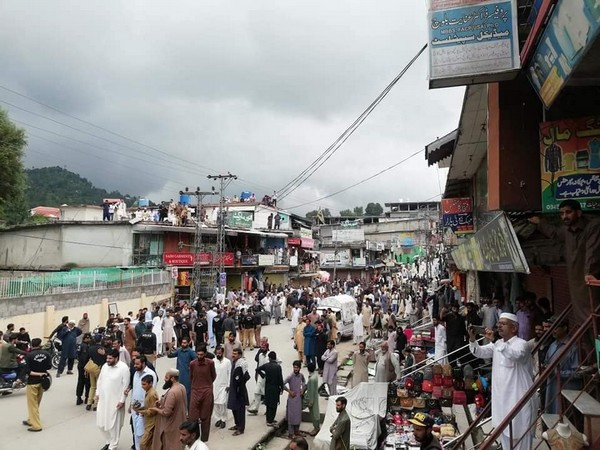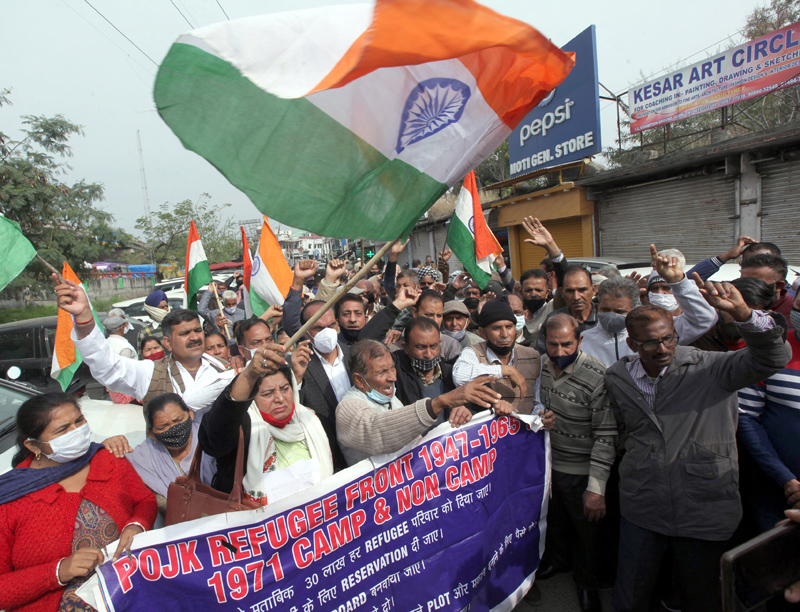“Open Road to India’s Kargil We will go back to our historical roots: Anti-Pak Protests in Gilgit; Shia Muslims Protest Blasphemy Law”
 KRC TIMES Desk
KRC TIMES Desk

Dr. Sunil Kumar
For the majority of Pakistanis, the momentous aspect was that while PoJK was experiencing widespread violence, a calm and well-organised election was simultaneously happening in the Union Territory of Jammu and Kashmir, where the celebration of democracy is being celebrated with record-breaking voting in most of the area.
The most cruel and severe blow was that Pakistani military vehicles were set on fire and the Pakistani flag was lowered at a key point in PoJK. There is a deep sense of alienation and distrust of Pakistan. The unprecedented uprising in PoJK would have been unimaginable just a few years ago.
The general impression was that these people would never go against Pakistan as society has been radicalised with a multitude of Jihadist groups operating in the area and the oppressive presence of Pakistani security forces and intelligence officials (ISI). Nevertheless, the basis of the current uprising in PoJK and Pakistan-Occupied Gilgit-Baltistan (PoGB) is that despite ‘elected governments’, they have no say in their governance.
What Pakistan is awfully worried about is that the growing alienation could make people in PoJK re-evaluate their options of either staying under the yoke of a bankrupt and autocratic Pakistan or re-uniting with the erstwhile state and benefiting from India’s vibrant democratic polity and robust economy. Moreover, in response to a recent query regarding PoJK, External Affairs Minister Dr. S Jaishankar remarked that India will be watching developments in PoJK and PoGB very closely, and if the opportunity presents itself, then ending Pakistan’s occupation of Indian territory will be considered.

Follow Us
Political Malevolence: PoJK is part of the erstwhile princely state of Jammu and Kashmir (J&K) and hence an integral part of India. It has been under the illegitimate control of Pakistan since October 22, 1947, when tribal lashkars supported by the regular Pakistani army invaded the princely state of J&K.
After accession, the Indian state of J&K followed the democratic path according to the Indian constitution, while the area (PoJK) under Pakistani occupation remained a colony of Pakistan.
It was bifurcated into the so-called ‘Azad Jammu and Kashmir (AJK) and the ‘Northern Areas’. The occupation of PoJK has been facing political suppression and undemocratic practices, Although, Pakistani government has
introduced some rudimentary administrative structures, such as executive decrees and not popular representations. Even the Supreme Court of Pakistan has no jurisdiction over the area. Even though it is called ‘Azad’ or independent, the region has only nominal powers and functions under the direct rule of the federal government of the Pakistani state.

Many observers from PoJK confess in their writings that they have been denied the constitutionally guaranteed fundamental rights that the rest of Pakistan has. It remained an administrative, not constitutional, part of Pakistan. The popular perception in PoGB today is that the region was illegally annexed by a forceful unilateral decision to impose itself on the land and people of PoGB, which is a clear violation of the resolutions of the UNCIP on J&K, demanding total independence from Pakistan.
Geo-Strategy of PoJK and China Factor: Because of its location as a gateway to Central Asia, PoJK has immense strategic implications for India. PoJK borders with Pakistan, Afghanistan, and Tajikistan to the west and the Xinjiang province of China to the north. Furthermore, China’s role in PoJK is unjustified, as Pakistan illegally gave Beijing 5,180 square km of Indian territory in Shaksgam Valley in 1963, on which China built the Karakoram Highway.
Due to the illegitimate Karakoram Highway and the China-Pakistan Economic Corridor (CPEC), the geopolitical significance of PoJK has increased manifold, unquestionably impacting India’s long-term security objectives. If PoJK were under Indian control, the geopolitics of the subcontinent and its global fallout would have been very different from what they are today.
Demography Changes: The demographic composition of the Gilgit-Baltistan region of the PoJK has undergone a sea change since 1947 as a result of a deliberate strategy of the Pakistani government to turn the original inhabitants of the region (mostly Shia) into a minority. The sectarian divide has plagued PoJK for a long time.
Anti-Shia riots engineered by the Zia regime in the late 1980s engulfed the area and claimed 700 lives. Moreover, the abrogation of the State Subject Rule, which had historically protected the local demographic composition, was a deliberate effort by Pakistan to settle Sunnis from other parts of the country in the region in order to dilute the Shia dominance of PoGB.

Human rights violations: In PoJK Pakistan’s persistent dissemination of false propaganda has effectively concealed the human rights abuses in PoJK from the outside world, only revealing them to the international community when they visited the region to aid earthquake victims in 2005.
The 2006 Rights Watch study, the International Crisis Group’s Gilgit-Baltistan study, gave an account of the unprecedented human rights violations in PoJK. In addition, the Human Rights Commission of Pakistan (HRCP) has indicated in its reports that ISI operates throughout PoJK.
Terrorist Training Camps and Jihadi Influence: Since the 1990s, PoJK has been a hotspot of Islamist militancy, as confirmed by the 26/11 Mumbai attacks. Ajmal Kasab and David Headley confessed that terrorist groups like Lashkar-e-Taiba formed strong ties with the local population after the 2005 earthquake because they provided extensive relief under the guise of Jamaat-ud-Dawa, which trapped victims into joining terrorist campuses to survive.
Strategic Roadmap for India: India under Narendra Modi has again led to a shift in its PoJK approach. Home Minister Amit Shah stated in Parliament that when he referenced Jammu and Kashmir, he included PoJK and Aksai Chin (under Chinese occupation). Policymakers in India must be proactive for PoJK, an integral part of the country.
India should mobilise world opinion against Pakistan’s terrible governance and illegal occupation of PoJK and reaffirm its claim according to the 1994 parliamentary resolution. India must engage the PoJK diaspora, especially those living abroad, and new political leadership to promote and support pro-India political actors in PoJK rather than taking a defensive stance.
As PoJK’s demographic map has changed significantly, Chinese and Islamist influences are on the rise. Governments, policymakers, and analysts should clarify their PoJK goals and ensure that attempts to separate PoJK from the rest of the country will be firmly resisted by all necessary means.
(The author is a Project Fellow Department of Strategic and Regional Studies, University of Jammu)


